Fighting Google My Business (GMB) Spam
No matter how hard Google tries to manage it, there are persistent spam profiles on Google Maps. Chances are that your listing's visibility is impacted by a competitor's inappropriate listing that diminishes your ranking.
Service area businesses (SAB) are disproportionately impacted by map spam. This category includes businesses like plumbers, locksmiths, garage door repair, carpet cleaning, etc., (ex. any type of business that comes to your home to do work.)
Regular brick-and-mortar locations can also be affected by spam listings that are breaking guidelines in order to rank higher than they should.
Types of Google My Business Spam
It's important to understand the types of GMB spam because it will impact the way the listing should be reported for the quickest removal.
Fake Listings
Fake listings are listings that should not exist at all on Google Maps. They are sometimes created en masse by lead generation companies and have obvious naming patterns, but many are created individually by companies to increase their reach on Google Maps. Bottom line is that these are intentionally created and fictional listings.
Duplicate Listings
Duplicate GMB listings are primarily automatically created by the Google algorithm. The business owner oftentimes does not even know that there is a duplicate listing of their business.
Keyword Stuffed Listings
According to the Google My Business guidelines, the names that appear on the business listing should match the actual legal business name of the listing. There is some leeway here, but this typically means that the GMB name should be exactly the same as the legally registered business name, or match the name that appears in permanent signage outside the business. Any other words on the listing are considered superfluous and keyword stuffing.
Benefits of Spam Fighting
For the health of your business listing, it's important to get rid of competitors' spammy GMB listings. In the image, you'll see a Google Maps search where one legitimate listing is surrounded by listings that break the guidelines. Two of those keyword stuffed listings are outranking the legit business presumably because they have added extra keywords to the listing name.
For the health of your business listing, it's important to get rid of competitors' spammy GMB listings. In the image, you'll see a Google Maps search where one legitimate listing is surrounded by listings that break the guidelines. Two of those keyword stuffed listings are outranking the legit business presumably because they have added extra keywords to the listing name.
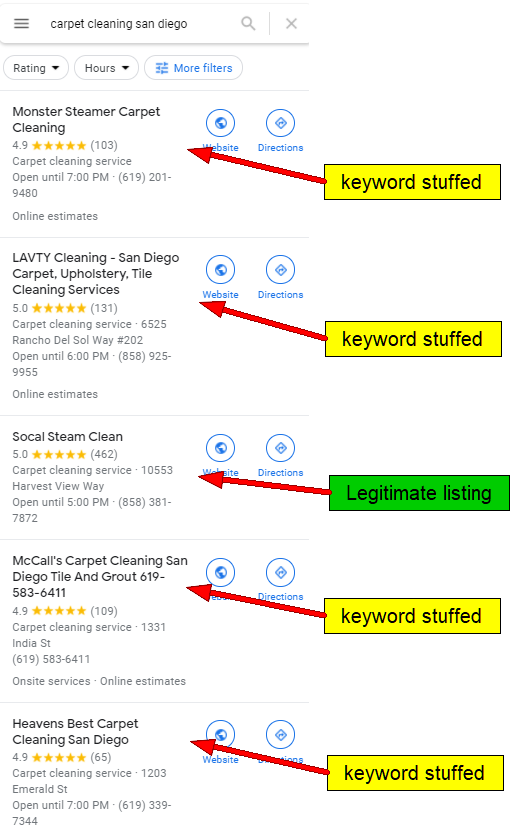
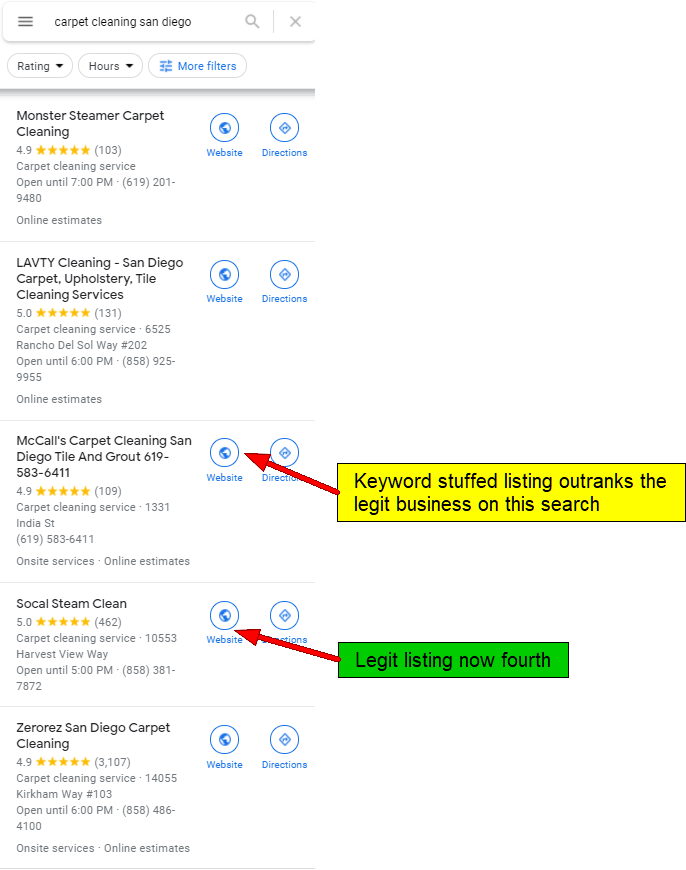
How many calls are lost to competitors because of Google Maps manipulation?
Making sure competitor listings are not getting an unfair advantage in the search results is a local SEO task worth your time. If you are a service area business, you'll find your industry is plagued with this type of activity, and fighting it will lift your presence in the maps.
How Local Falcon Helps Your Spam Fighting Efficiency
Local Falcon scans search results across an entire target area, and not just at one point. This allows you to easily see and prioritize your spam-fighting efforts.
Using the same business examples from above, this is what the Local Falcon scan result looks like.
If you need a primer on what you are seeing, take a brief moment and read about Local Falcon ranking visualizations.
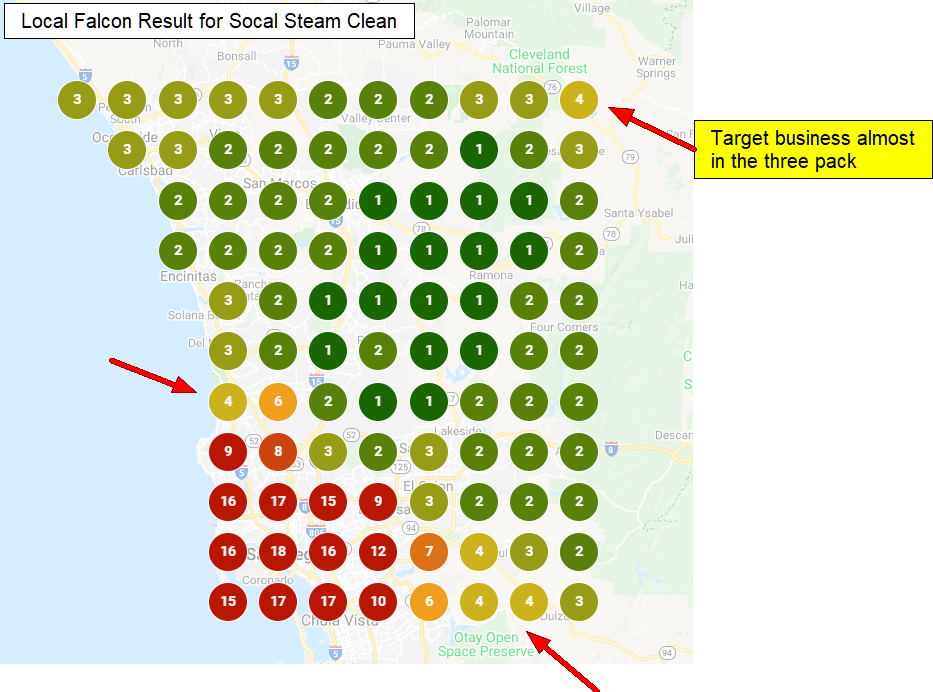
The arrows point to locations where our target business is just out of the coveted three-pack. Exploring these areas by (clicking on the circle) will display the list of businesses currently ranking there.
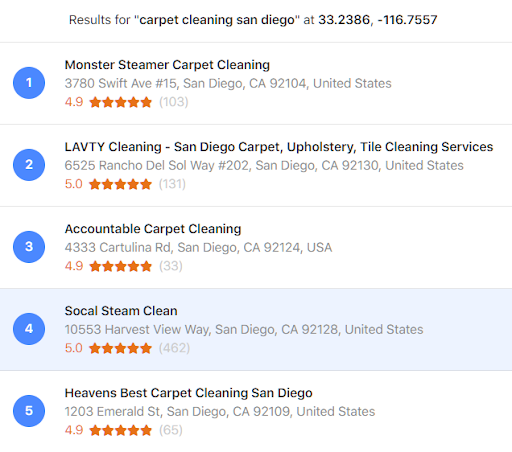
We can now see which businesses are outranking our business at this location and target any listing for breaking Google guidelines.� Each pin location will likely have a different ranking order.
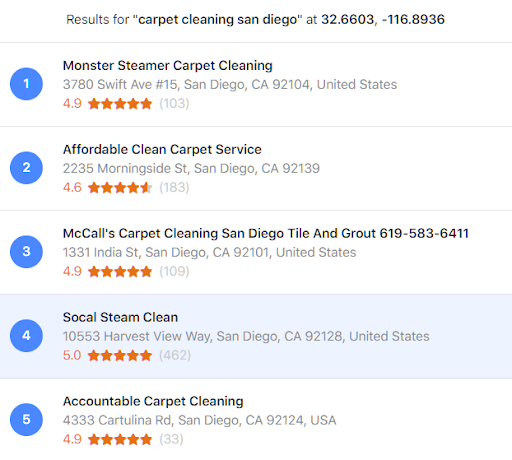
By focusing on areas where our business is almost ranking in the three-pack, we can maximize our time and make the most impact in the least amount of time. Of course, as time allows, getting rid of all nearby competitors that break the rules is optimal.
How to Get Rid of Spammy Listings
Now that we know how to identify listings that are breaking Google rules, how do we go about getting rid of them?
The first step is to report the listing by using the "Suggest an edit" feature on the listing itself. If you are using Local Falcon, clicking on the listing name will open up the actual listing on Google Maps.
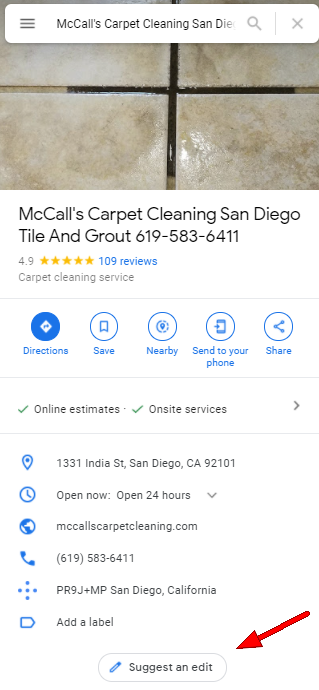
This will bring up a dialog box with some options. Depending on the type of spam we have discovered, we will choose the appropriate option.
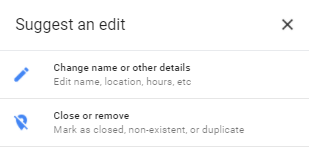
If the listing is a real business but has extra keywords in its name, then choose "Change name or other details," and write the correct name, and then submit.
If the listing should not exist because it is a duplicate, or completely fake listing, then choose "Close or remove," and choose from the list that appears.
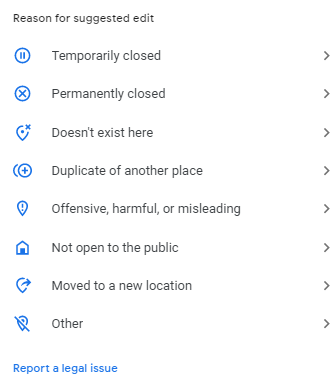
After you submit in either of these cases, one of three things will occur (within a few minutes):�
- Your edit will be accepted
- Your edit will be denied
- Your edit will be pending
You can see the status of any of your edits by going to the contributions section of your Google profile.
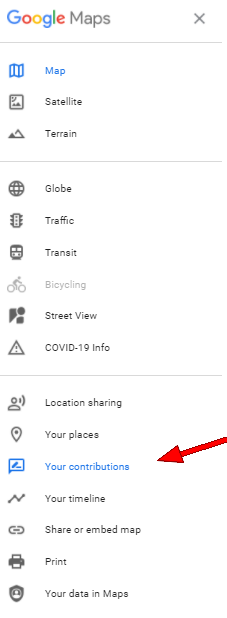
If your edit is accepted, great. If your edit is denied or goes pending, then proceed to the next step, which is to submit the edit using the Google Redressal Complaint form.
Fill out all the applicable fields and provide a brief description. Provide evidence if you have it, such as links to the secretary of state business registry or images. Remember that the Google support team looking at your entry is likely located in India or the Philippines and may not understand your local environment. Be very clear about which guideline is being broken without being too wordy. After you submit that form, you will receive an email with a ticket number.
Lastly, if two to three weeks have passed after submitting the form, and still no action has been taken, head on over to the official Google My Business forum and create a thread, again with a brief description of the issue including the ticket number that you received. A GMB product expert will be able to escalate the issue if they see it is warranted.
Extra Notes
If you are submitting a lot of edits, it's a good idea to keep a spreadsheet of which listings were submitted along with the dates and any ticket numbers to help you keep organized.
Reporting competitors is completely anonymous and Google will not send any information about your reporting efforts to other businesses.
When submitting proof through the redressal form, Google will only accept official government sites and will not accept social media profiles or third-party directories.
In Summary
Waiting on Google to spontaneously fix the spam problem on Maps is not the answer. False profile information has been going on for years. Take a proactive approach to this issue and spam-fighting on Google Maps to provide quick wins for your business or clients. Using Local Falcon can help you maximize that effort. And remember to keep your own profile error-free.
If you need more help and advice on fighting spam and/or improving your own Google listing, be sure to join us on one of our local SEO webinars [link to webinar page] and check out all the dbaPlatform and Local Falcon have to offer.


